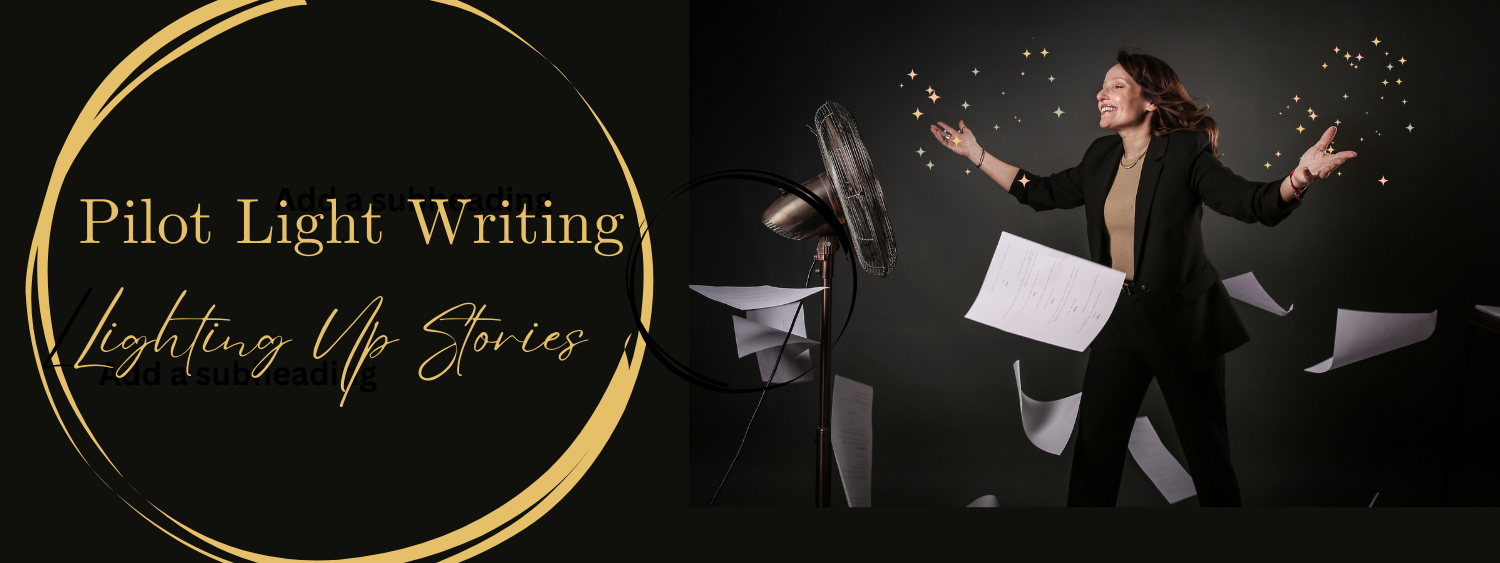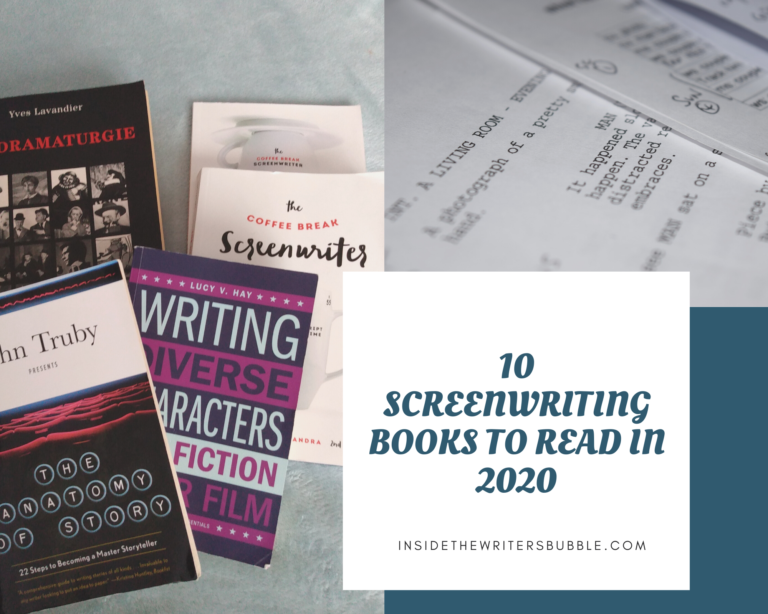
Here is a list of books that have changed my craft. I really hope some of them will help you too.
So to be clear with everyone, I don’t get sponsored for this list and these books are not classified in order of importance either.
1. The Idea: the Seven Elements of a Viable Story for Screen, Stage or Fiction by Erik Bork
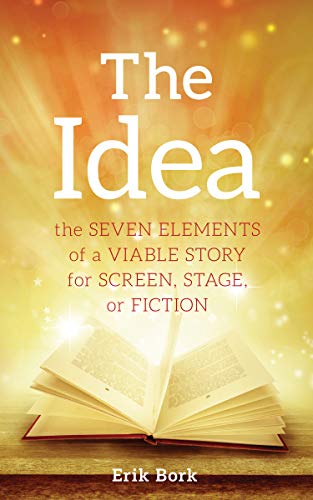
‘The hard part is creating something that the ‘right people’ would be excited by if they read it.’ Erik Bork
It’s THE book that explains what a strong concept is and why it’s so important to have one before starting any writing. This book is well-explained and down to earth. I also liked the practical and humble voice of the writer.
Why would you need this book?
- To make sure your idea is bullet proof before embarking on a long writing journey.
- To become the best at coming up with marketable ideas.
- To have a clear insight on how the industry works.
2. The Anatomy of Story by John Truby
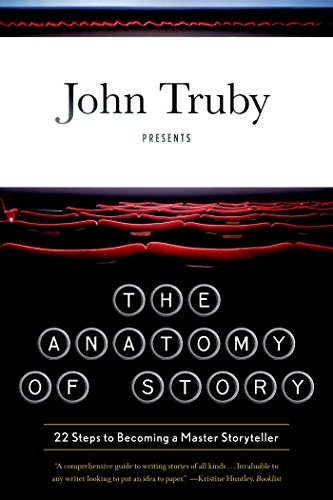
‘Write something that may change your life. This is a very high standard, but it may be the most valuable piece of advice you’ll ever get as a writer. Why? Because if a story is that important to you, it may be that important to a lot of people in the audience. And when you’re done writing the story, no matter what else happens, you’ve changed your life.’ John Truby
This book is a classic for screenwriters especially for those who think that most films are predictable. Mr Truby has a way to ask the right questions so you can write your story ‘organically’ and not generically. Brilliant book, great teacher.
Why would you need this book?
- Your story is too predictable and you don’t know what to do about it.
- You want to write a story that feels organic and original not a copycat.
- You want to create characters who feel real and multi-dimensional.
3. The Coffee Break Screenwriter by Pilar Alessandra
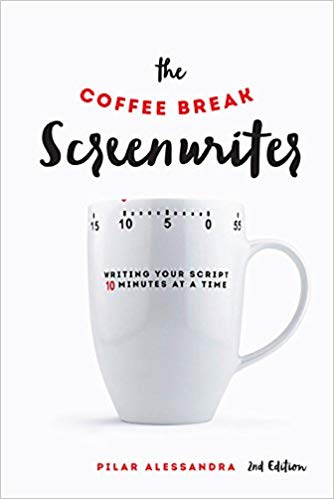
‘Ten minutes gives you the ‘ticking clock’ every writer secretly needs: a deadline.‘ Pilar Alessandra
Pilar Alessandra is well-known in the industry, she was the Senior Story Analyst at DreamWorks SKG before becoming the Director of the writing program On the Page. The Coffee Break Screenwriter is always on my desk. Each time I get stuck on a script, I can count on this book to sort me out. I would also recommend any of her seminars. She is A-M-A-Z-I-N-G.
- You always complain that you don’t have time to write.
- You don’t know how to organize your writing sessions.
- You want your characters and story to be multi-layered.
4. Writing Diverse Characters For Fiction, TV or Film by Lucy V. Hay
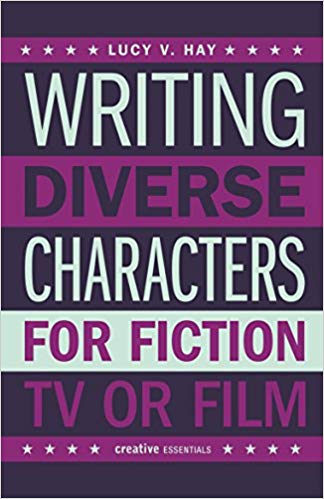
‘Bad characterization feels two-dimensional, wooden, unbelievable and inauthentic‘. Lucy V. Hay
Lucy V. Hay is an author, screenwriter, producer, script editor and, founder of one of the most popular blog for writers: Bang2write. Always ahead of any trends, Lucy knows her stuff inside out. Characterization is one of the most important element of your screenplay. If the reader doesn’t feel for your main character, you’re out, as simple as that. It doesn’t mean that your character has to be lovable though…
Why would you need this book?
- You get notes from professional readers telling you that your characters are clichéd or two-dimensional.
- Your characters look the same (slim, young and white) and thus don’t represent the majority of your audience.
- You feel your story is boring and going nowhere.
5. The 10-Day Screenplay Solution: Learn How to Write Lightning Fast by Ken Miyamoto
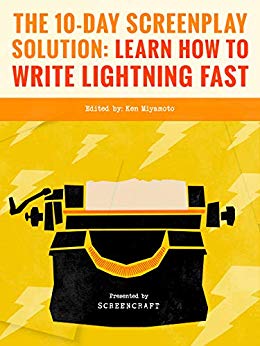
‘Writing a screenplay is no simple task. While it’s great to study up on the various formulas, directives, structures, and methods, all that you really need when you finally start a script are the basics. Everything else will fall into place. Embrace the Less is More mantra, and you’ll have better dialogue and better scenes.’ Ken Miyamoto.
Ken’s book is about uncluttered writing. I call it ‘Feng Shui writing’. Ken’s philosophy when it comes to screenwriting is: Less is More. I love it. Ken Miyamoto also has a website that no screenwriter should ignore: ScreenCraft.
Why would you need this book?
- You write too much prose or/and dialogue.
- You want to learn how to write great descriptions.
- You want to avoid making mistakes that gatekeepers are tired of.
6. Getting It Write by Lee Zahavi Jessup
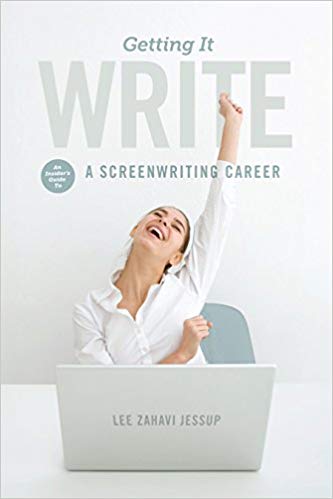
‘Always be writing. Actively, continuously, on an ongoing basis. The more you write, the better you will get. It’s as simple as that. Your third script will be better than your first; the fifth better than your third. As a working professional, it’s your job to continuously come up with exciting new work.‘ Lee Jessup
This book is not about how to write a screenplay but how to build a career as a screenwriter. It gives a good guidance on the strategy to follow. And needless to say, it’s a proven strategy. Lee Jessup is another big name in the industry. Her honest approach might scare some, but she is right when she says: ‘your writing habits are to put your head down and do the work.’
Why would you need this book?
- You want to be a screenwriter but you have no idea how to get there.
- You need an insight on how the industry works.
- You want to go from amateur to professional screenwriting.
7. My Story Can Beat Up Your Story by Jeffrey Alan Schechter
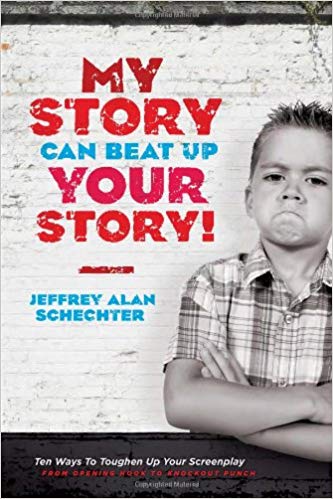
‘Beyond wish fulfillment, a good story should offer a fully dimensional emotional experience’. Jeffrey Alan Schechter
I have to admit, I have a soft spot for this book. I have read many screenwriting books in my life but this one is different. Expect some a-ha! moments while reading it.
Why would you need this book?
- You are confused on structure.
- All your characters always sound the same.
- You are looking for a method that allows you to be creative.
8. The Guide For Every Screenwriter by Geoffrey D. Calhoun
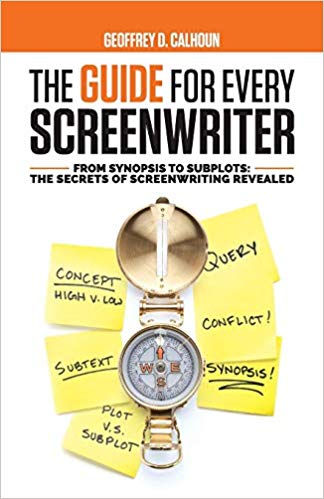
‘Talent can be cultivated. It can be learned and taught with the proper instruction and a good mentor. No one is born a blacksmith. They became one with hard work. So too does the screenwriter’. Geoffrey D.Calhoun
In this guide, you’ll find all the tools you need to write your screenplay from choosing your theme, your concept, characters, structure, plots, format… to what comes next, such as: the rewrites, the coverage, the synopsis template and networking. Geoffrey was listed in the top 100 Indie writers in the world and was the founder of wefixyourscript.com. This guide is for every screenwriter: the newcomer and the experienced writer. Excellent book.
Why would you need this book?
- You are looking for an all-in-one book on screenwriting.
- You need to learn the main steps of the creative process.
- You need to learn the specific features of each step.
9. The 21st Century Screenplay: A comprehensive Guide to Writing Tomorrow's Films by Linda Aronson
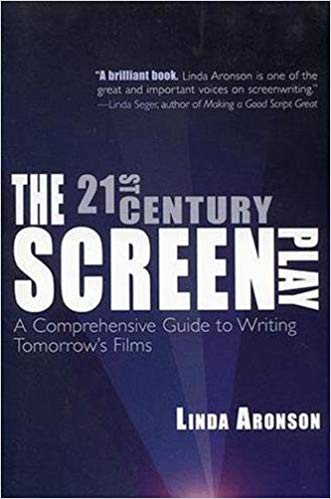
‘All of us, experienced writers and newcomers, need to take on competition in the way that Olympic athletes do: calmly, consciously and consistently aiming high, pushing our imagination and talent to the limits.’ Linda Aronson
I cannot write a post on screenwriting without mentioning Linda Aronson, who is famous for her work on non-linear structure and complex multiple storylines. Linda also knows the rules of storytelling inside out and will break them one by one with ingenuity. She has a ‘real but unusual’ insight on writing screenplays. I like the fact Linda invites us to adapt the structure to the story and not the other way round. Exceptional book. Not to be missed. Expect some light-bulb moments reading this too. For more information, I invite you to visit Linda’s website https://www.lindaaronson.com/
Why would you need this book?
- You would like to go off the conventional way of telling a story.
- You want to master the art of flashbacks and non-linear structures.
- You want to write complex multiple story-lines.
10. Writing Drama: a Comprehensive Guide for Playwrights and Scriptwriters by Yves Lavandier
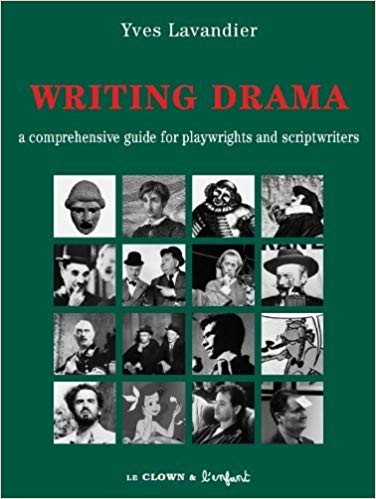
‘In every conflict, there are seeds of misfortune and destruction but also seeds of union, understanding and enrichment. Conflict makes things move forward‘. Yves Lavandier.
Last but not least: La Dramaturgie (Writing Drama) by Yves Lavandier. I first read this book in 1997. Even today, I often find myself reading some chapters over and over again. Whether you are writing a novel, a play or screenplay, this book covers it all: structure, characterization, conflict, dialogue, comedies, short films, documentaries… It’s my precious book, I swear by it and I know that I’m not the only one.
Why would you need this book?
- You want to know what lies behind the rules of storytelling.
- You are craving to add some depth to your writing.
- You are done with gurus and ready made formulas.
Happy reading and keep writing!
